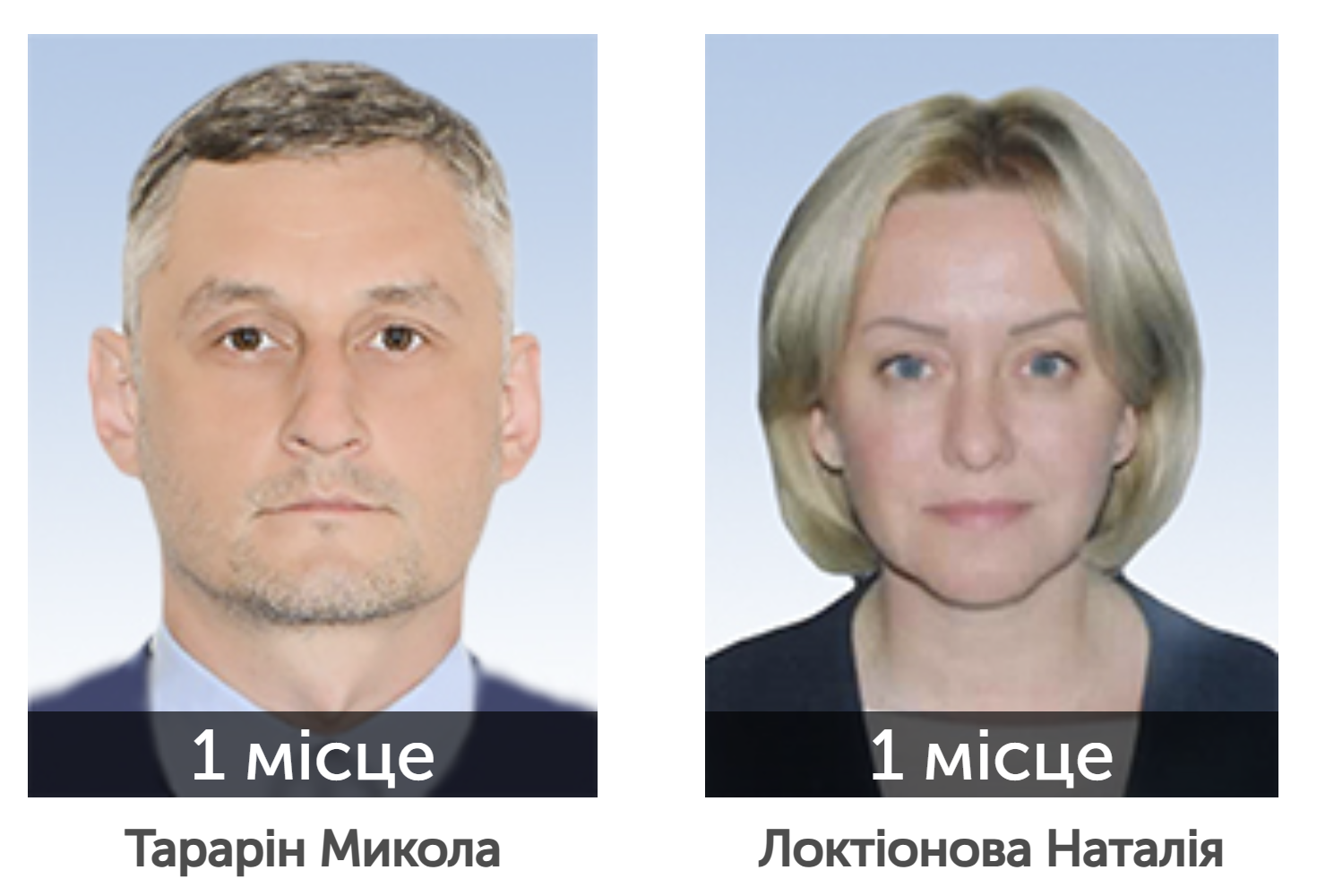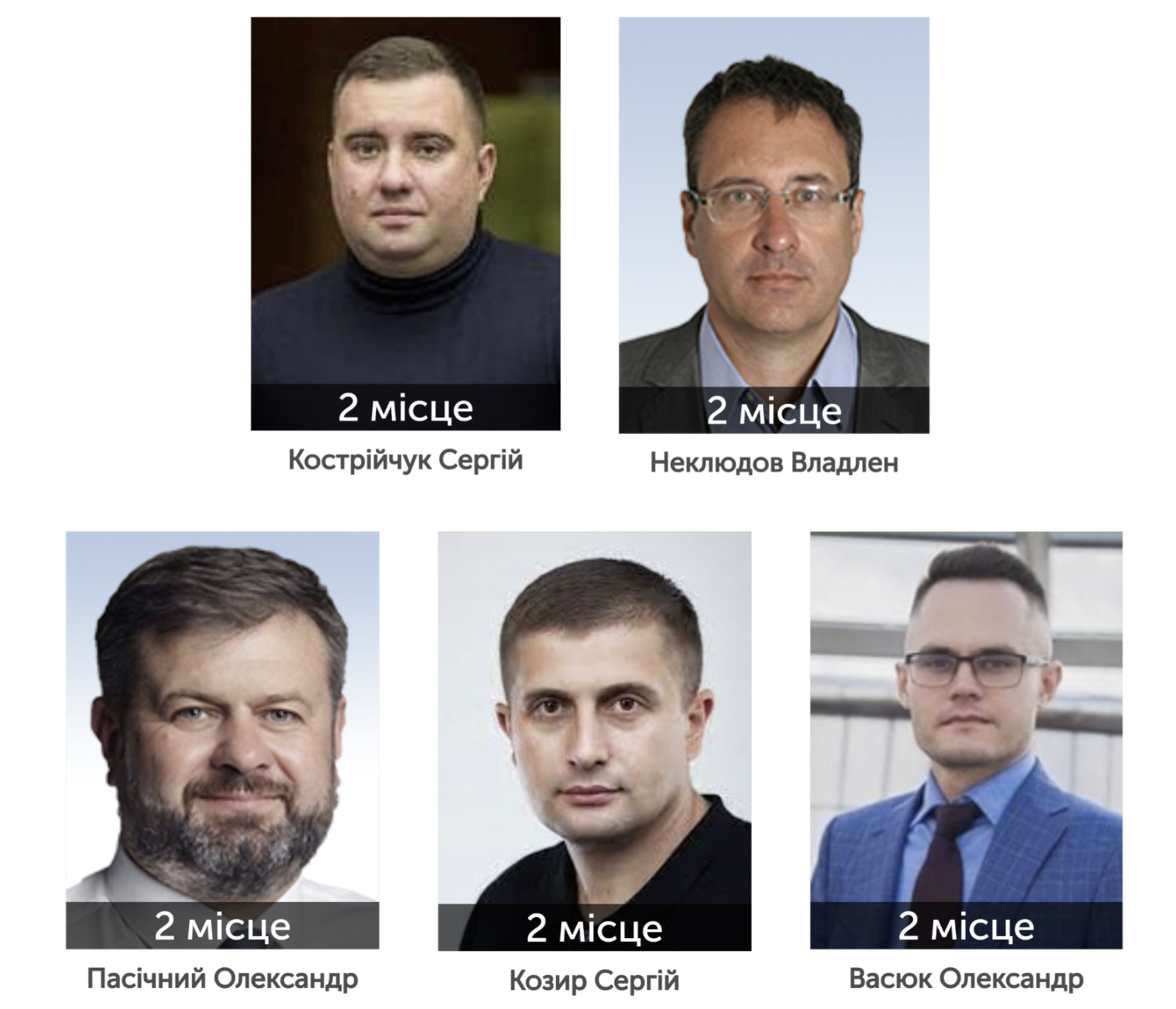The eleventh session of the Verkhovna Rada, for the first time in two years, revealed unexpected trends: alongside significant reforms, counter-reforms also emerged. How did parliamentary efficiency evolve in the third year of the full-scale war? The updated MP Efficiency Score indicated that nearly 60% of people’s deputies lowered their effectiveness during this session. More details on the changes in the work of the Verkhovna Rada are presented below.
Key findings
- Nearly 60% of deputies reduced their effectiveness compared to the previous results from the 10th session: the average MP Efficiency Score dropped from 70% to 66%.
- For the first time in two years, two counter-reforms were introduced: the Law on Lobbying (-0.5 points) and the Law on “White Business Club” (-1.5 points), both of which were supported by almost all MPs.
- Factions showed varying dynamics in efficiency: Servant of the People’s Efficiency Score dropped three percentage points compared to the previous session, Holos dropped by 10 points, and the PFLP faction saw its efficiency plummet by nearly a third (from 64% to 45%).
- New counter-reformers emerged within the mono-majority: 15 MPs supported reforms at a rate of less than 40%, with most of them previously being consistent supporters of change.
- Ten lawmakers scored 0% effectiveness due to systematic absenteeism or being under investigation.
- The number of reformist MPs sharply decreased from 38% to 22%, while the share of moderate reformers grew significantly (from 46% to 64%).
Key draft laws
During the 11th session, experts from the Reform Index recorded and evaluated 33 significant laws. Among them, for the first time in the last two years, two counter-reforms were identified: the law on lobbying, which poses risks of persecution for citizens or civil organizations (experts’ rating: -0.5 points), and the law on “white business club,” which creates unequal rules by granting preferences to certain taxpayers (experts’ rating: -1.5 points). Prior to this, the last counter-reforms were passed back in July 2022.
Figure 1. Number of laws included in the Reform Index by sessions
Note. During the seventh session, at the start of the full-scale invasion, eight laws were passed, but the voting results for these are not available on the Verkhovna Rada website. Although the Reform Index project experts evaluated them, these laws were not included in calculating the MP Efficiency Score. In response to our inquiry, the Verkhovna Rada stated that from March 3 to April 14, 2023, voting in the session hall was conducted using an electronic system without nominal recording of results for security reasons.
A significant achievement of the 11th session was the adoption of six laws that scored over 2 points (a threshold we consider distinguishing major reforms from minor ones). These include the ratification of the Rome Statute of the International Criminal Court (+4 points), the law banning the Russian Orthodox Church in Ukraine (+3.5 points), the simplified granting of combatant status (+2.25 points), individual educational trajectories (+3 points), the expansion of English language use in Ukraine (+3 points), and a resolution introducing new rules for implementing gas agreements under production-sharing contracts (+2.3 points).
Methodology: How MP rankings are calculated
MP Efficiency Score is an indicator that shows how people’s deputies voted on reform-oriented laws in the Verkhovna Rada. A high score is awarded to those who supported progressive changes, while a low score reflects MPs who voted against or abstained from voting altogether.
To calculate the Efficiency Score, we first identify a list of important reformist and anti-reformist bills. Experts from the Reform Index evaluate each bill selected by the Index’s editorial board on a scale from -5 to +5 points, depending on its expected impact on the economy. For instance, a law aimed at improving energy efficiency receives a high positive score, while a law on industrial parks, which reduces budget revenues without significantly boosting economic activity, receives a negative score.
Next, we examine which specific bills a particular MP voted on. If they support a reform-oriented bill, they receive the number of points assigned to it by the Reform Index experts. If the MP votes for an anti-reform initiative, their rating decreases by the corresponding number of points. Voting “against” or being absent during the vote is scored as zero points.
The final Efficiency Score is calculated as the percentage of points the MP earned out of the maximum possible points during their term. For example, if an MP accumulated 80 points out of a possible 100 over 100 days in office, their Efficiency Score would be 80%.
An ideal score of 100% would be achieved by an MP who voted for all reformist laws and did not support any anti-reform bills. People’s deputies who consistently ignore important changes will have low scores.
Such rankings allow us to track who in Parliament is genuinely driving change in the country and who is merely “sitting idly,” not voting for reforms. Based on the rankings, voters can draw conclusions about the effectiveness of their elected representatives.
At the same time, the MP Efficiency Score is not an exhaustive assessment of an MP’s activity. It does not reflect their work in committees, lobbying for bills, or efforts to oppose harmful legislation, among other activities. Therefore, for a more comprehensive picture, we recommend consulting additional sources. For example, the PolitHub portal by the CHESNO Movement compiles biographies of politicians, including records of unethical or criminal behavior and votes on harmful bills.
Some MPs have had to leave their parliamentary duties for legitimate reasons.
We do not count missed votes for these individuals, so their rankings are not reduced due to their absence from parliamentary sessions.
MPs who joined the Armed Forces include Roman Lozynskyi and Roman Kostenko (Holos), Mykhailo Zabrodskyi (ES), Serhii Rudyk (For Future), Sviatoslav Yurash (Servant of the People), Liudmyla Buimister (non-factional MP), and Yana Zinkevych (ES), who serves as the commander of the volunteer battalion Hospitallers.
Since February 24, 2022, we have not counted the votes of these lawmakers if they were absent from sessions.
For female MPs who were on maternity leave, missed votes did not affect their rating:
- Oleksandra Ustinova (Holos), January 29, 2022 – September 6, 2022;
- Anastasiia Liashenko (Servant of the People), since February 6, 2023;
- Aliona Shkrum (Batkivshchyna) November 23, 2023 – April 23, 2024;
- Sofiia Fedyna (European Solidarity), October 20, 2023 – February 22, 2024;
- Larysa Bilozir (Dovira), November 28, 2922 – April 18, 2023;
- Anna Skorokhod (For Future), December 9, 2019 – April 28, 2020;
- Yelyzaveta Yasko (Servant of the People), March 23, 2023 – November 11, 2023;
- Yuliia Svitlychna (non-factional MP), March 27, 2921 – August 15, 2021;
- Darya Volodina (Servant of the People), November 6, 2022 – May 2, 2023;
- Olha Koval (Servant of the People), June 7, 2023 – October 26, 2023;
- Lesia Vasylenko (Holos), March 23, 2021 – September 21, 2021;
- Liudmyla Marchenko (Servant of the People), July 12, 2023 – January 10, 2024;
- Anastasiia Radina (Servant of the People), December 4, 2019 – April 23, 2020;
- Olha Saladukha (Servant of the People), June 16, 2023 – November 7, 2023.
If you are aware of objective and legitimate reasons for an MP’s absence during voting, please let us know, and we will recalculate their rating.
MPs who switched factions during the session are counted as belonging to the faction they were part of at the end of the session, regardless of when the switch occurred. In the final rankings across all sessions, an MP is counted in the faction they belong to at the conclusion of the latest session included in the rankings.
Key voting trends
The range of reform scores for laws passed during the 11th session is significantly broader than that of laws passed in other sessions, spanning from -1.5 to +4. At the same time, MP Efficiency Scores became more concentrated around average values. A total of 59% (256 MPs) saw a decline in their scores compared to previous results.
Figure 2. Histograms of MP rating distribution for the 10th and 11th sessions
The average rating score for the 11th session is 66% (a decrease of 4 percentage points compared to the 10th session), while the overall average across all sessions, including the latest, stands at 68%.
Figure 3. Average MP Efficiency Score (MPES) of factions per session ±1 standard deviation
Only Serhii Rudyk received the maximum score of 100%, with his rating calculated under special conditions due to his service in the Armed Forces of Ukraine. Other “perfect scorers” from the previous session could not maintain their status after the introduction of counter-reforms. The strategy of supporting all legislative initiatives indiscriminately—a common approach since the start of the full-scale invasion—backfired for many MPs. Only two MPs voted against the “white business club” law: independent Dmytro Razumkov and Iryna Friz from the European Solidarity faction (70 deputies abstained or did not vote). Meanwhile, no MPs voted against the law on lobbying (56 abstained or did not vote).
Additionally, 61 MPs (15% of Parliament) voted “For” all the laws selected by the Reform Index experts. Since they lost 5% for supporting counter-reforms, their Efficiency Score for the 11th session stands at 95%. Among them are 59 MPs from Servant of the People, independent Oleksandr Korniyenko, and Serhii Velmozhnyi from the Dovira faction.
Who are the leaders, and who lags behind?
Based on the eleven sessions’ results, the leaders remain Nataliia Loktionova and Mykola Tararin, who joined the Verkhovna Rada during the ninth session. However, their support for both counter-reforms reduced their Efficiency Scores by a few percentage points. 
Consistently ranking at the top from session to session are Oleksandr Pasichnyi, Vladlen Nekliudov, Serhii Kostriichuk, Serhii Kozyr, and Oleksandr Vasiuk (97% each). Close behind are Mykola Stefanchuk, Oleksandr Bozhkov, Yurii Zdebskyi, and Serhii Shtepa, each with an Efficiency Score of 96%. All of them traditionally belong to the mono-majority. 
Ten MPs received an Efficiency Score of 0% during the last session, all of whom are consistent absentees. Stepan Ivakhiv and Ihor Palytsia stopped attending votes in the Verkhovna Rada as early as 2023. Fedir Khrystenko left the country at the beginning of the invasion. Anzhelika Labunska and Serhii Shakhov have also not appeared in the session hall since 2022, though they participate in committee meetings remotely. Nestor Shufrych, Oleksandr Dubinskyi, and Oleksandr Ponomariov are under investigation for treason, while Yaroslav Dubnevych is currently wanted.
Average faction scores: between stability and decline
The average MP Efficiency Scores of factions over the entire convocation remain stable (Figure 4). The lowest scores are shown by deputies from opposition factions (Batkivshchyna, PFLP, and For Future). However, scores for the 11th session have noticeably declined across all factions (Figure 4).
Figure 4. Average MP Efficiency Score of factions by session and cumulative values across all sessions: decline in efficiency during the 11th session
Note: This graph does not show the OPFL faction, which operated in Parliament during sessions 1–6. Members of this faction are displayed within the PFLP and For Future groups, which they joined after their party was banned. It is evident that the largest counter-reformers of the Rada joined PFLP, significantly altering its behavior.
Servant of the People lost three percentage points in Efficiency Score compared to the 10th session, while Holos dropped by 10 points. MPs from PFLP, who had almost unanimously supported the mono-majority’s policies during the last four sessions with scores of 80–90%, have now halved their efficiency. Their average Efficiency Score for the 11th session stands at 45%, a 19-point drop from the 10th session.
This decline is linked to a new strategy—PFLP MPs simply abstain from voting, even though their attendance in the session hall remains high. Such attendance figures can be achieved by using an MP’s card: if it is inserted into the slot, the MP is marked as present, even if they are not physically in the chamber. In the first half of 2024, the percentage of active voting (pressing any of the buttons “For,” “Against,” or “Abstained”) among PFLP MPs dropped from 50–70% to 30–50%.
Fewer reformers, more compromises: What has changed in reform support
To track efficiency, we divide MPs into three groups based on their level of reform support: reformers (Efficiency Score from 100% to 89% inclusive), moderate reformers (88.99% to 40% inclusive), and counter-reformers (below 40%).
The percentage of reformers has significantly decreased—from 38% at the end of the 10th session to 22% following the 11th session. Correspondingly, the share of moderate reformers has grown by 18 percentage points (from 46% to 64%). The proportion of counter-reformers has also slightly declined (from 17% to 15%). MPs have started voting in a more balanced and less polarized manner, indicating overall stabilization of voting patterns. However, this also reflects a loss of Parliament’s radical momentum for reforms.
Figure 5. Share of reformers, moderate reformers, and counter-reformers after the 3rd, 8th, 10th, and 11th sessions
Figure 6. Level of reform support by individual MPs across factions (during the 11th session)
During the 11th session, nearly all reformers were members of Servant of the People or former representatives of the faction, such as Oleksandr Korniyenko and Ruslan Stefanchuk (independent due to their official positions). Additionally, two MPs each from Dovira (Oleksandr Sukhov and Serhii Velmozhnyi), Holos (Yaroslav Ruschyshyn and Volodymyr Tsabal), and For Future (Taras Batenko and Serhii Rudyk) joined the ranks of reformers.
In opposition factions, we observe no reformers and the largest number of counter-reformers. Meanwhile, within the mono-majority, 15 MPs had reform support below 40%. Among them, the lowest Efficiency Scores for the 11th session were recorded by Olha Savchenko (4%) and Liubov Shpak (7%). Most of the newly emerged counter-reformers from Servant of the People had been consistent supporters of reforms up to the 10th session. However, some, such as Olha Savchenko, Zhan Beleniuk, Orest Salamakha, and Vasyl Mokan, had occasionally been classified as counter-reformers in the past.
Table 1. Servant of the People counter-reformers based on the 11th session results and their Efficiency Score dynamics across all sessions
Which sectors are seeing the most reforms
Experts of the Reform Index evaluate regulatory acts across six key areas: 1) Governance, 2) Public Finance, 3) Monetary Policy, 4) Business Environment, 5) Energy Independence, and 6) Human Capital.
This ranking methodology allows for an analysis of how factions support different areas of reform.
Figure 7. Average level of reform support by sector (cumulative across 11 sessions)
Servant of the People consistently shows the highest level of reform support across all categories. Their strongest areas of support are Monetary Policy (89%), Governance (85%), Public Finance (84%), and Human Capital (83%). Compared to previous results, these scores have shifted slightly (by 1–2%): support for the business environment has increased, while support for Monetary Policy has slightly declined.
Among other factions, support for Monetary Policy has increased by 1–3%, with the largest growth seen in European Solidarity. The Business Environment shows mixed dynamics: support decreased in Dovira (-1 percentage point) and increased in other factions. Notably, Holos improved its score from 50% to 57%, and Batkivshchyna saw an increase from 16% to 26%.
The areas related to Governance and Public Finance have shown little to no change across any faction, as has the energy sector. Ratings for Human Capital also differ only marginally.
The trend remains consistent with previous updates: opposition factions continue to focus on social issues and provide limited support for reforms in governance, public finance, and other initiatives spearheaded by the mono-majority.
Conclusion
The eleventh session marked the end of the period of consolidated parliamentary work that defined the first two years of the full-scale war. The emergence of counter-reforms and the widespread decline in MPs’ efficiency reflect the exhaustion of the crisis-driven consensus and a shift back to traditional political dynamics. Although Parliament continues to pass essential reform-oriented laws, the overall slowdown in the pace of change and increasing moderation highlight the need for renewed incentives to drive the country’s transformation forward.
Фото: depositphotos.com/ua
Attention
The author doesn`t work for, consult to, own shares in or receive funding from any company or organization that would benefit from this article, and have no relevant affiliations



